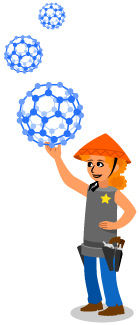What is nanotechnology?
 It’s time to think small. I mean really, really, really small. A nanometer is one-billionth of a meter. Structures of that size are much too small to see, even with a powerful laboratory microscope. But what if doctors had ultra-tiny tools they could use to repair parts of broken cells? Or what if they could insert pumps the size of molecules into sick people to deliver medicine only in the spots it was most needed?
It’s time to think small. I mean really, really, really small. A nanometer is one-billionth of a meter. Structures of that size are much too small to see, even with a powerful laboratory microscope. But what if doctors had ultra-tiny tools they could use to repair parts of broken cells? Or what if they could insert pumps the size of molecules into sick people to deliver medicine only in the spots it was most needed?
These ideas are not science fiction. Welcome to the world of nanotechnology and nanomedicine. In this world, scientists are creating and using materials and devices the size of atoms and molecules. Engineers are already working to create miniature computers made out of DNA, the material that codes all life on Earth. Others are creating tiny semiconductor chips made out of strings of individual molecules.
Scientists want to better understand how the body’s own molecular machines work when we are healthy. Once that understanding is strong enough, doctors will put nanomedical tools and techniques to work to help repair damaged cells and cure sick cells in our bodies when we are ill. The work continues to advance. Scientists are learning more each day.
Additional images from Wikimedia via William Thielicke (CG droplets).
Read more about: Microbes
Bibliographic details:
- Article: Nanotechnology
- Author(s): Dr. Biology
- Publisher: Arizona State University School of Life Sciences Ask A Biologist
- Site name: ASU - Ask A Biologist
- Date published:
- Date accessed:
- Link: https://askabiologist.asu.edu/nanotechnology
APA Style
Dr. Biology. (). Nanotechnology. ASU - Ask A Biologist. Retrieved from https://askabiologist.asu.edu/nanotechnology
Chicago Manual of Style
Dr. Biology. "Nanotechnology". ASU - Ask A Biologist. . https://askabiologist.asu.edu/nanotechnology
Dr. Biology. "Nanotechnology". ASU - Ask A Biologist. . ASU - Ask A Biologist, Web. https://askabiologist.asu.edu/nanotechnology
MLA 2017 Style

Be Part of
Ask A Biologist
By volunteering, or simply sending us feedback on the site. Scientists, teachers, writers, illustrators, and translators are all important to the program. If you are interested in helping with the website we have a Volunteers page to get the process started.

